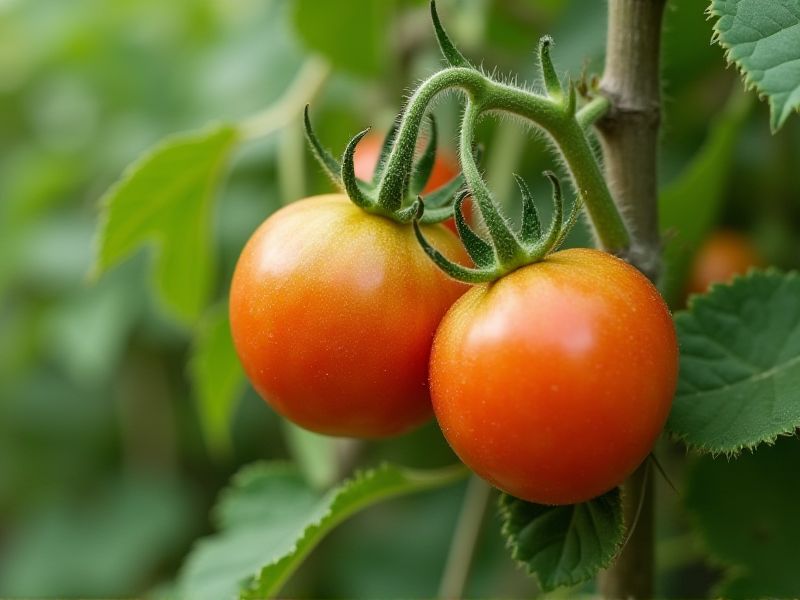
Container gardening allows you to grow a variety of fruit-bearing plants, even in limited space. Strawberries thrive in pots, producing sweet berries while maximizing vertical space with hanging baskets. Dwarf varieties of apple trees, such as 'Honeycrisp' or 'Gala,' adapt well to containers, providing delicious apples within reach. Blueberries require acidic soil and are not only productive but also offer ornamental value with their stunning foliage. By selecting the right pot and ensuring adequate drainage, you can enjoy fresh, homegrown fruit from your patio or balcony.
List of some Fruit-bearing plants that suit containers
- Dwarf Citrus (Citrus spp.)
- Strawberry (Fragaria × ananassa)
- Fig (Ficus carica)
- Cherry Tomato (Solanum lycopersicum var. cerasiforme)
- Blueberry (Corymbosum)
- Gooseberry (Ribes uva-crispa)
- Olive (Olea europaea)
- Pomegranate (Punica granatum)
- Raspberry (Rubus idaeus)
- Grape (Vitis vinifera)
Important things about Fruit-bearing plants that suit containers
Size Of The Container
When selecting fruit-bearing plants suitable for containers, consider their size and growth habits to ensure optimal growth and fruit production. Dwarf varieties, such as 'Bush Champion' tomatoes or 'Patio Prince' strawberries, thrive in limited space, making them ideal for small patios or balconies. Additionally, citrus trees like 'Improved Meyer' lemon and 'Calamondin' orange are compact and produce fragrant blooms and delicious fruit in containers. Your container's dimensions should accommodate the root system, typically requiring at least 5 to 10 gallons for healthy growth of these productive plants.
Drainage Requirements
Effective drainage is crucial for fruit-bearing plants in containers, as it prevents root rot and promotes healthy growth. When choosing a container, select one that has multiple drainage holes to facilitate excess water removal. Incorporate materials like gravel or perlite at the bottom of the container to enhance drainage further, ensuring that the roots can access air and water without becoming waterlogged. Regularly check the moisture level in the soil and avoid overwatering to maintain optimal conditions for your fruit-bearing plants.
Soil Quality
High-quality soil is crucial for nurturing fruit-bearing plants in containers, ensuring adequate drainage and nutrient retention. A well-balanced mix typically includes organic matter like compost or peat moss, enhanced with perlite or vermiculite to improve aeration. It's essential to monitor pH levels, aiming for a slightly acidic to neutral range of 6.0 to 7.0, suitable for most fruit plants. Regularly enriching the soil with fertilizers can support robust growth, leading to an abundant harvest of delicious fruits.
Sunlight Exposure
Fruit-bearing plants in containers thrive best with adequate sunlight exposure, typically requiring at least six to eight hours of direct sunlight per day. Varieties like strawberry, tomato, and dwarf citrus trees are excellent choices for container gardening, as they adapt well to limited space while producing abundant yields. Make sure to position your containers in a location that receives optimal sun, as insufficient light can lead to reduced fruit development and overall plant vigor. Regularly rotating your plants can also maximize sunlight exposure, ensuring all sides receive equal light, which promotes balanced growth and fruit production.
Watering Needs
Fruit-bearing plants in containers require consistent watering to thrive and produce a healthy yield. You should ensure the soil remains moist but not waterlogged, as excess moisture can lead to root rot. Container plants typically dry out faster than those in the ground due to limited soil volume, so check for moisture levels regularly, especially during warm weather. Using self-watering containers can help maintain optimal moisture levels and reduce the frequency of watering, making it easier to care for your plants.
Pollination Requirements
Many fruit-bearing plants that thrive in containers require specific pollination methods to maximize fruit yield. For example, dwarf varieties of apples and cherries are self-pollinating, meaning you can grow a single plant and still expect fruit production. On the other hand, plants such as blueberries and strawberries often benefit from cross-pollination, so consider planting multiple varieties close together to enhance fruit set. To ensure successful pollination, you might also attract pollinators by incorporating flowering plants nearby or manually pollinate by transferring pollen using a small brush.
Space For Root Growth
Choosing fruit-bearing plants that thrive in containers requires careful consideration of root growth space. Plants like strawberries, dwarf citrus trees, and patio tomatoes are excellent options, as they have compact root systems that adapt well to smaller spaces. Providing at least 12 to 18 inches of depth in your container will facilitate healthy root expansion and promote fruit production. Regularly refreshing the soil with nutrient-rich compost can also enhance root health and increase your yield.
Varieties Suitable For Containers
Fruit-bearing plants that thrive in containers include dwarf varieties such as 'Pixie' apple trees, which can produce crisp apples in limited spaces. Strawberries like 'Eversweet' are perfect for hanging baskets, yielding sweet berries with minimal care. For tropical flavors, consider growing a 'Trovita' orange tree, known for its compact size and succulent fruit, making it ideal for patios. With the right potting mix and adequate sunlight, you can enjoy freshly harvested fruits even in small gardens.
Seasonal Care
Fruit-bearing plants that thrive in containers can bring delicious produce to your patio or balcony. Dwarf varieties of fruit trees, such as the "Meyer Lemon" or "Miniature Fig," are perfect for limited spaces and require adequate sunlight and well-draining potting mix. Strawberries and blueberries are also excellent choices, as they can flourish in hanging baskets, allowing for both easy harvesting and aesthetic appeal. Regular watering and balanced fertilizer will ensure your container garden remains productive throughout the growing season.
Fertilization Needs
Fertilization is crucial for container-grown fruit-bearing plants, as they rely on limited soil for nutrients. Choose a balanced fertilizer, such as a 10-10-10 NPK mix, to ensure your plants receive sufficient nitrogen, phosphorus, and potassium for healthy growth. Regularly monitor soil moisture levels and apply a slow-release organic fertilizer every 4-6 weeks to support fruit development without overwhelming the root systems. Your container should also have adequate drainage and be placed in a sunny location to maximize fruit yield and ensure vibrant plant health.
